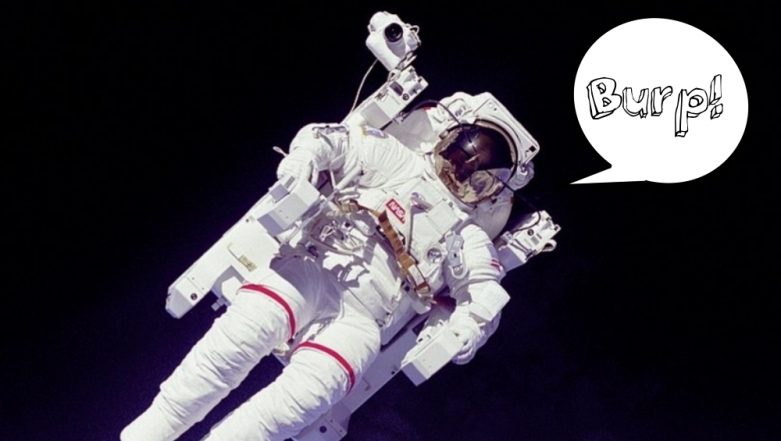Learn to Astronomy: Join us on a cosmic journey as we uncover the mysteries of space! In this article, we delve into the intriguing question of why astronauts can’t burp in space. Discover the fascinating science behind this phenomenon and gain a deeper understanding of how the absence of gravity impacts our bodily functions in the extraterrestrial realm. Unlock the secrets of the universe with Learn to Astronomy!
Why Astronauts Can’t Burp in the Zero-Gravity Environment of Space
Astronauts cannot burp in the zero-gravity environment of space due to the absence of gravity’s force on the digestive system. On Earth, burping is a natural process that occurs when excess gas, such as swallowed air or carbon dioxide produced during digestion, is expelled from the stomach through the esophagus and mouth.
However, in space, without the downward pressure of gravity pulling the gases towards the lower part of the body, they tend to disperse and float freely. As a result, any gas released from the stomach remains in the form of tiny bubbles dispersed throughout the digestive system. This can cause discomfort and bloating for astronauts.
To overcome this issue, astronauts often have special diets and take medication to prevent excessive gas production. Additionally, they may use tools like drinking straws or devices that create artificial pressure to help expel excess gas occasionally. Overall, the absence of gravity in space affects various bodily functions, including the ability to burp, requiring astronauts to adapt their diet and employ alternative methods to address digestive issues.
Astronauts can’t burp normally…
[arve url=”https://www.youtube.com/embed/l7kLT8l602U”/]
Zero Gravity Burping Woes: Why Astronauts Can’t Burp in Space
[arve url=”https://www.youtube.com/embed/ngsUTdgw1NE”/]
Preguntas Frecuentes
What causes astronauts to be unable to burp in space?
Astronauts are unable to burp in space due to the absence of gravity or the reduced effects of gravity. In a gravity-free environment, gas bubbles that form in the stomach do not rise to the top like they would on Earth. Instead, these bubbles float freely in the digestive system and cannot be expelled through burping. This can lead to discomfort and bloating for astronauts. Additionally, the lack of gravity affects the release of gases in general, making it more difficult for astronauts to pass gas as well. To mitigate these issues, astronauts may have to follow specific dietary guidelines and take medication to help regulate their digestion while in space.
How does the lack of gravity affect the ability to burp for astronauts in space?
The lack of gravity in space affects the ability to burp for astronauts. When we burp, it is because of the accumulation of gas in our stomach that is released through the esophagus. On Earth, gravity helps to pull the gas bubbles upwards, allowing them to escape through the mouth. In space, however, without the force of gravity, gas bubbles tend to remain dispersed throughout the stomach, making it difficult for astronauts to burp.
In microgravity environments like space, bodily gases do not separate easily from liquids and solids. The lack of gravity prevents the gas bubbles from rising to the top of the stomach, resulting in a feeling of fullness and discomfort for astronauts. Instead of burping, they may experience other symptoms like intestinal gas and bloating.
To alleviate this issue, astronauts may use specially designed tools and techniques to help release trapped gas in their stomachs. These methods may include consuming carbonated drinks or using devices that create pressure on the abdomen to simulate the effect of gravity.
In summary, the lack of gravity in space hinders the ability of astronauts to burp normally. They may experience discomfort due to the accumulation of gas bubbles in their stomachs, but they have developed methods to mitigate these effects during space missions.
Can the inability to burp in space cause any health issues for astronauts?
The inability to burp in space does not cause any significant health issues for astronauts.
While burping is a natural bodily function that helps release excess gas from the stomach, it is not crucial for maintaining good health. In the microgravity environment of space, the lack of gravitational pull does not allow gases to separate from liquids in the stomach as effectively as on Earth. As a result, astronauts may experience increased bloating and discomfort due to trapped gas in their digestive system.
However, to mitigate these effects, astronauts follow specific dietary guidelines and consume specially developed foods during their space missions. These foods are designed to minimize gas production in the digestive system, helping to alleviate discomfort. Additionally, astronauts undergo regular physical exercise routines that help stimulate their digestive systems and promote gas release.
In summary, while astronauts may experience discomfort due to the inability to burp in space, it does not pose any significant health risks thanks to the specialized diets and exercise routines they follow.
In conclusion, the curious phenomenon of astronauts not being able to burp in space is directly linked to the absence of gravity. Without gravity, the separation between liquids and gases in our stomachs is disrupted, leading to the production of larger and foamy bubbles instead of smaller and more easily released gas bubbles. These larger bubbles cannot rise to the top of the stomach as they would on Earth, resulting in discomfort for astronauts and potentially interfering with their daily activities. While this may seem like a minor inconvenience, it highlights the intricate relationship between gravity and bodily processes that we often take for granted. Our understanding of how our bodies adapt to the unique conditions of space continues to expand, adding yet another layer of fascination to the field of astronomy and paving the way for future space exploration.

